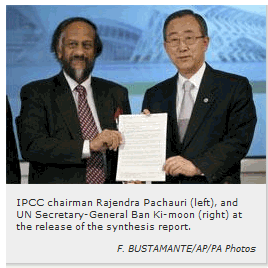|
News & Views item - November 2007 |
![]() IPCC in Its Synthesis Report has Raised the Tone of Urgency with its
Latest Report.
(November 20, 2007)
IPCC in Its Synthesis Report has Raised the Tone of Urgency with its
Latest Report.
(November 20, 2007)
The Aim of the IPCC is to give policy-makers a concise summary of the findings of all three of its detailed research summaries which were released earlier this year.
 This
version is the product of further consideration by the committee of the
overall reception given to its more comprehensive analyses and is
notable for containing more pressing language relative to the earlier
output.
This
version is the product of further consideration by the committee of the
overall reception given to its more comprehensive analyses and is
notable for containing more pressing language relative to the earlier
output.
For example it refers to the "dangerous anthropogenic interference with the climate system" an assessment missing from the previous; because, according to Nature, "of objections from some political delegates to the panel's conferences".
One of the minor talking points during the current election campaign is the meeting next month in Bali to discuss a follow-up pact to the carbon-cutting agreement of the Kyoto Accords.
The synthesis report released in Valencia, Spain, by UN secretary-general Ban Ki-moon, confirmed that it is at least 90% certain that rising temperatures are significantly contributed to by human activities and suggests possible strategies for at least reducing if not avoiding world temperature rises.
What Australia's role will be at the Bali talks will be determined in the main by whom the Australian voting public elect to be Prime Minister on November 24th.
As NatureNews points out, recent research shows that the "carbon intensity" of the global economy the amount of greenhouse gas emitted per unit of economic productivity is climbing, mostly as a result of the coal-dependence of China and other emerging nations. Previously, economic analysts had not expected such a trend.
NatureNow then reports:
"The predictions for any given emissions scenario are likely to be underestimates the most benign view of future change," says Bob Spicer, an earth scientist at the UK's Open University. "Those areas undergoing most rapid change now (the Arctic and continental interiors) are likely to be where the biggest errors in the predictions lie."
Hans Verolme, head of the conservation group WWF's Global Climate Change programme in Washington DC, points to the existence of a section within the synthesis report called 'reasons for concern', which he says acknowledges the risk of both abrupt climatic shifts and irreversible impacts. Although there is "a little hedging and qualifying going on", he says, the fact that such a statement is in the report is notable.
The good news is the report also says we have a small window of opportunity to take decisive action, Verolme says, suggesting that politicians now have all of the evidence and analysis they need to pursue cuts in greenhouse-gas emissions in Bali next month. The IPCC shows us that those cuts need to be not small, but deep.
Finally there are the five take home messages from the new report:
Warming of the world's climate is "unequivocal" 11 of the past 12 years (1995-2006) rank among the 12 warmest years since 1850.
It is "likely" (meaning a 66% likelihood) that there has been significant man-made warming on every continent except Antarctica over the past half-century.
Continued greenhouse-gas emissions at or above current rates would induce climate changes that would be "very likely" (meaning a 90% likelihood) to exceed those observed during the twentieth century.
Fossil fuels will dominate the world's energy portfolio until at least 2030, and emissions look set to rise by 25-90% during that time.